Gideon Saar’s Days of Rest
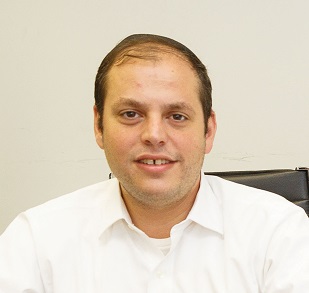
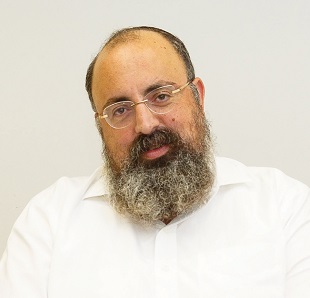
Who is Gideon Saar, the one politician on the Israeli scene who could be considered a true nemesis to Netanyahu?
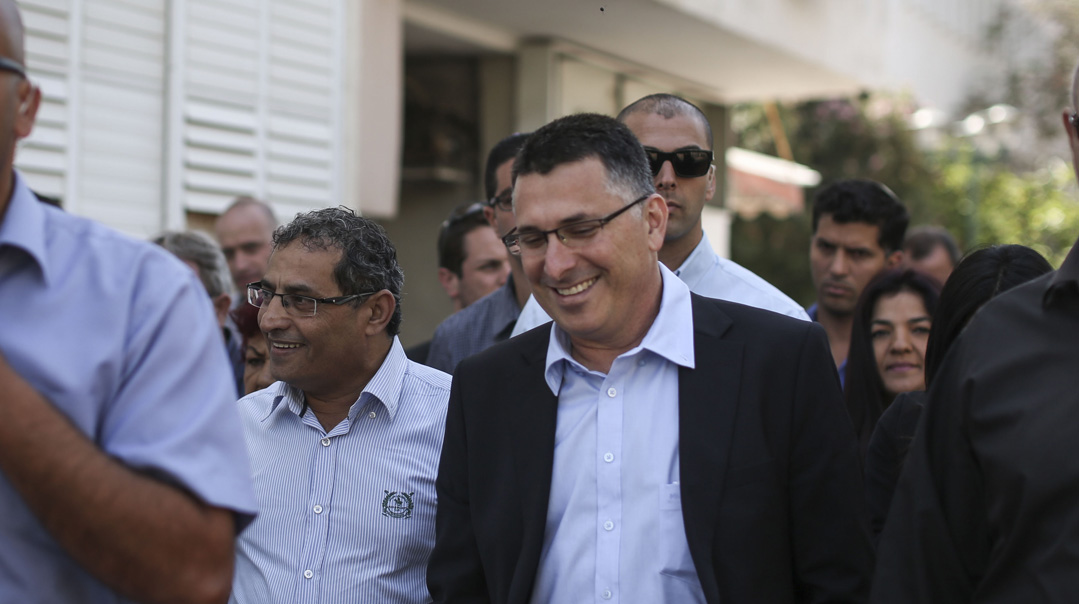
I
n the seemingly never-ending battle for the character of Shabbos in Eretz Yisrael, Gideon Saar, born into a secular, Tel Aviv family, played a starring role. In one of his final acts as Minister of the Interior a little more than a year ago, he enforced the law banning supermarkets from opening on Shabbos in the city of his birth.
Secularists were appalled, chareidim applauded, and the media charged Saar with chareidi-pandering in advance of a presumed campaign to dethrone Binyamin Netanyahu in the upcoming Likud primaries.
They were wrong.
A couple of months later, Saar gathered a crowd of 1,000 supporters for a pre-Rosh Hashanah toast to announce he was taking a “time-out” from politics to devote more time to his family. “I felt that this was the right thing for my loved ones. My son David will start walking soon, and I want to be there, right next to him, holding his hand.”
His declaration came as a shock to the political system. Widely respected inside his Likud Party — as well as by the opposition — for his skill as a parliamentarian, Saar had twice finished second to Prime Minister Netanyahu in Likud primaries. Another primary was coming up soon and the conventional wisdom had it that the third time could be the charm, where either a Netanyahu slip or a Saar leap would place Saar first.
Why was Saar, then 46 and peaking politically, dropping out? And how much truth was there to the rumors that Saar, whose father once served as David Ben-Gurion’s personal physician, was becoming religiously observant? And if true, how did his newfound Yiddishkeit influence his decision to exchange a hat in the political ring for a kippah in the privacy of his home?
A year has now passed since his departure. Except for some sporadic political postings on his Facebook page, with liberal sprinklings of pictures of him on tiyulim with David and snapshots of his wife’s Shabbos challahs, Saar avoided all publicity — until he agreed to sit with Mishpacha on the one-year anniversary of his return to private life.
The interview coincides with an upsurge of political scuttlebutt that Saar is poised to announce his political comeback. It also comes on the heels of a new Maariv poll showing that Saar’s sabbatical hasn’t harmed his political standing one bit. He is still running a close second to Bibi among Likud voters, at a time when Bibi’s political capital has been drained by his losing, bruising battle over the Iran deal.
We will probe Saar during the course of our interview for signs that he will soon make another dramatic announcement — this time, that he’s coming back.
But if the new Tel Aviv apartment he moved into a few weeks ago is any indication, Saar is still in the downsizing mode. This residence is smaller than his previous home. In a way, it completes the construction of Saar’s new image of a family man, whose focus in life is modesty, his home, and Jewish values.
Pictures of him affixing the mezuzah at his chanukas habayis also grace his Facebook page, along with images of the minyan of men who joined him in spending much of the evening sharing words of Torah.
Shortly after we sit down in his salon, little David, who indeed is quite ambulatory, joins us every so often to sit on his father’s lap, or to partake of the refreshments Saar set out for us.
The first thing that catches your eye is the diversity of Saar’s library. There’s a set of Rambam, seforim by Rav Kook, a book of speeches by Ze’ev Jabotinsky — founder of the Beitar movement who still informs the Likud’s political stances — alongside biographies of prominent world leaders.
Saar proudly shows us his collection of Bukharan siddurim and Yizkor books documenting the history and heroism of his maternal ancestors. Their deep-rooted desire to make aliyah and leave nothing behind spurred their decision to disinter their dead relatives from Bukharia and carry the remains along on their month-long journey to the Holy Land, where they were buried again on Har Hazeisim.
“I remember those who said that the Likud would compromise on Jerusalem. Really, now. Do you think that I, a descendent of people who sacrificed so much time, energy, and money to be buried in Jerusalem’s soil, would give any ground of this city?”
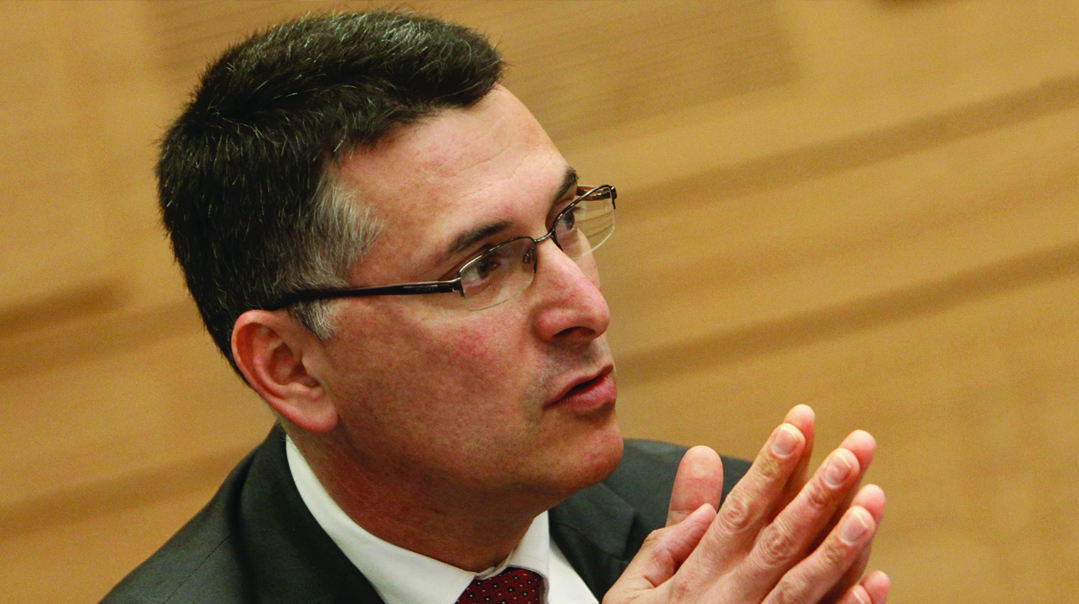
A Unifying Force
With that, Gideon Saar cements the right-wing credentials so foreign to his upbringing in a secular Tel Aviv neighborhood, where he attended a high school whose student body always votes with the left in the mock elections that Israeli high schools hold before all national elections.
He achieved the rank of staff sergeant in the IDF, then earned degrees in political science and law at Tel Aviv University. After four years as an aide to the attorney general and the state attorney, Saar served as Prime Minister Sharon’s cabinet secretary before winning election to the Knesset in 2003. Showing an independent streak, he fiercely opposed Sharon’s disengagement plan, threatening to resign twice during the course of the stormy national debate. Both times he retracted it because of heavy, personal pressure by Sharon, but to this day, he bemoans that plan and its outcome.
Yet Saar still admires Sharon’s political shrewdness and leadership. He even retains several characteristics reminiscent of Sharon: his tone, intonation, and even his body language and impish smile. Sharon enjoyed toying with the media, sometimes laughing with them and sometimes laughing at them. Saar perpetuates that tradition.
Today, many political pundits consider Saar to be the only Likud politician with the smarts and the personality capable of crafting a coalition that includes both the secular and more religious elements of the nationalist camp — someone who can attract support of the bourgeois, secular youngsters of Tel Aviv, while also appealing to the chareidim.
Saar’s time-out from politics was far from unprecedented. Bibi Netanyahu and Ehud Barak left politics for the private sector to strengthen their own personal financial positions prior to successful runs for prime minister. But Saar used the past year as a research fellow at the Institute for National Security Studies at Tel Aviv University, where he has authored papers on the faultiness of the Iran deal, Syria’s Civil War, and Israel’s new strategic position in the same old Middle East.
Simultaneously, he has been delving into his own Jewish heritage and deepening his commitment to an observant life. To call him a baal teshuvah at this stage would be going too far. But Saar has undertaken a significant role for himself in Israel’s fractious public arena: serving as a bridge between different sectors of the country. To achieve that ambitious goal, he needs to present a balanced image.
Saar noticed that when comedian Uri Zohar became a baal teshuvah and abandoned his old world, he lost his influence there, despite his considerable achievements. Many other celebrities of that generation who followed in Zohar’s footsteps experienced the same rejection among their old cronies. Saar, in contrast, doesn’t want to lose his identification with his current associates even as he forms a new identity.
Growing into Shabbos
Gideon Saar’s message to Israeli society is that one needn’t be religious to see the virtues of a core Jewish education for children, and that one needn’t declare himself a baal teshuvah to publicly observe Shabbos.
That’s the way he sees himself being effective, both privately and in the public sphere. “Gideon Saar is a traditional Jew. That’s how I classify myself,” he says. Having been noticed more often at recent public events with a kippah, sometimes knitted, sometimes black, we asked Saar how he decides which one to don. “I think statistically I wear a knitted kippah more often, but it’s not intentional.”
Saar didn’t grow up in a religious home, but he insists that his family was never disconnected from tradition. “My mother was a Tanach teacher. Woe unto me if I couldn’t answer the questions at the annual Chidon HaTanach Bible quiz that we would watch together. But when it came to the practical mitzvah observance, we weren’t there. Over the course of my adult life, I learned more and evolved in the way I define my Judaism.”
Saar has two children from his first marriage, which ended in divorce. In May 2013, he married television newscaster Geula Even. The birth of their son David propelled him to take a great leap forward in mitzvah observance.
“Before David’s bris, I invited a big rav to be his sandek. As my mazel had it, he couldn’t attend. So I decided I would be the sandek. When another rabbi in attendance told me only a Shabbos-observant Jew could serve as a sandek, I said: ‘So what’s the big deal? I promise to keep Shabbos from now on.’ And that’s what I did.
“Obviously, it wasn’t this instant turnaround. It was a process that matured over time. When you’re in the public sphere, and you bring your work home with you and it invades your personal life, you realize that Shabbos has to look different. But the process can take years. David’s birth was the catalyst to do something I would have possibly gotten to later on.
“But there’s something deeper here. When my son was born it became very important to me that he grow up with Jewish values, and that I had to be the one to present him with all the options. When he gets old enough to make his own choices, I don’t want him to base his decision on ignorance or boorishness — I want him to have a solid grounding in Jewish identity.”
Not wanting to break with his old circle of friends, Saar broke the news to them through osmosis.
“There was no official announcement. People slowly got used to it. Those first few Shabbosim that my cell phone was off, I’d open it on Motzaei Shabbos and find hundreds of text messages and e-mails wondering why I wasn’t available. Slowly, that diminished. Today, when I turn on my cell phone on Motzaei Shabbos there are hardly any messages. People got used to my new status very quickly.”
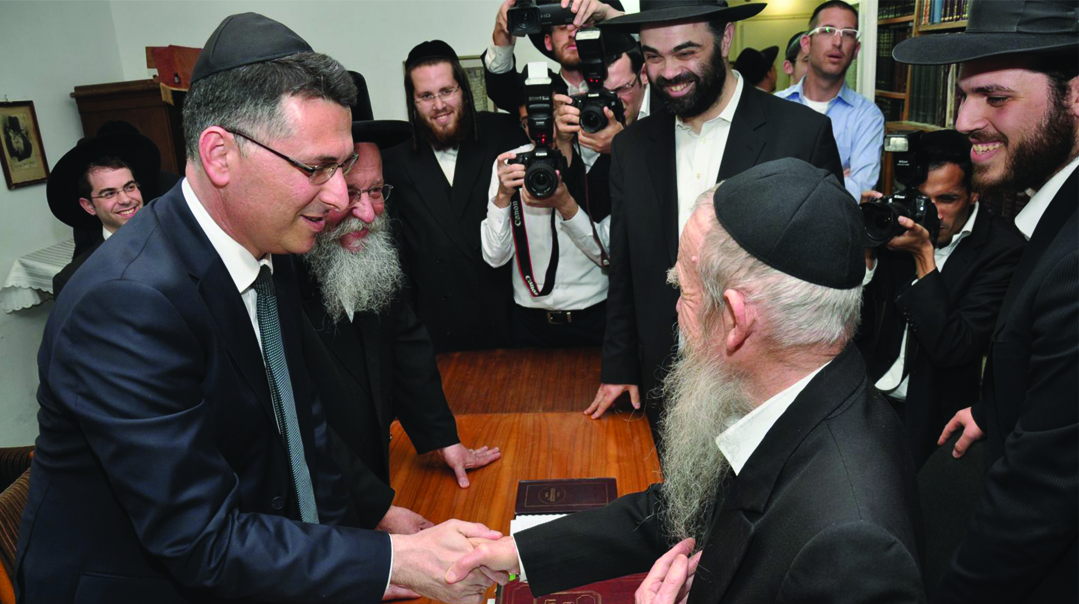
Mentor on Rechov Hakablan
Saar uses his newfound freedom on Shabbos to visit his father, who lives a 40-minute walk away. In a sense, that walk is a return to the footsteps of his paternal grandfather, who hailed from Kishinev and was strictly observant. His father Shmuel left Europe for Argentina when he was young and later made aliyah to Sde Boker, Ben-Gurion’s retirement home, in the 1960s.
“The home I grew up in was not political. I formulated my own worldview through my own independent study and research,” Saar says. “Lots of people seem to have trouble digesting the fact that there are people who have made their entire ideological journey on their own.”
In 1981, Saar would attend election rallies for Menachem Begin. “He really spoke to me,” Saar says. “When he called Ze’ev Jabotinsky his ‘rabbi’ it piqued my interest. Who was this rabbi, I wondered — so I ran to the library to read everything I could about him. When Begin spoke about his years in the Underground, I ran to the library again.”
Saar demonstrated that same level of self-motivation when it came to embarking on a steady diet of Torah study, at first using it to relieve the tedium of Knesset sessions.
“I set up a chavrusa with Rav Moshe Shapiro and I would travel to him in Bayit V’Gan every Monday when the Knesset scheduled its steady stream of no-confidence votes. We learned Rambam for about 90 minutes at a time and there’s no doubt that it was a very empowering experience. Today, I learn with a different chavrusa, and naturally, I also have more time. Recently we learned about Moshe Rabbeinu and Yona Hanavi, two leaders who didn’t want to lead, but who were pursued by that mission wherever they went.”
Saar paid some highly publicized visits to the homes of Rav Chaim Kanievsky shlita in Bnei Brak and Rav Ovadiah Yosef ztz”l in Har Nof, each leaving him with very strong and favorable impressions.
“When I saw Rav Chaim’s devotion for learning Torah and how little he lives with, it’s impossible not to be awed,” he says. “It’s something that I deeply admire, and I pray for the day that I can be less busy with public matters and my own parnassah and I can take more time for myself to learn.”
Saar met with Rav Ovadiah more than a dozen times, but the most memorable visit was more than three years ago, on Chol Hamoed Pesach, following dinner at Eli Yishai’s home.
“It was late at night and to see such an elderly person, in the middle of the chag, so immersed in his learning, not even seeing what was going on around him was just amazing,” Saar says.
While it’s not unusual for politicians in powerful positions to meet with gedolei Yisrael, Saar says he would try and visit even when he didn’t have official business to discuss.
“I saw my connection with him as something much deeper and he was very important to me and dear to my heart.”
Breaking Down the Walls
If Saar’s visits to gedolim showed that politics and religion are inseparable in Israel, one of the final decisions he made as a public figure — to ban supermarkets in Tel Aviv from opening on Shabbos — showed that the public is a major player in the same debate. And, according to Saar, that debate needs to be toned down.
His move generated an outcry that even he, a seasoned politician, failed to anticipate. But Saar says the most harrowing aspect for him was the cynicism his decision unveiled.
Instead of celebrating, appreciating, or even acknowledging his religious sensitivities, an embittered public pounced on the move as a politically motivated ply to grab the votes of religious and traditional Jews in advance of a primary challenge to Prime Minister Netanyahu.
When he resigned from the Knesset two months later, the cynics were proven wrong — but Saar remains shaken by the experience.
“To be honest, I didn’t expect the intensity of the opposition,” he admits. “I grew up in Tel Aviv and lived a very secular life. At the same time, there wasn’t a single supermarket open on Shabbos when I was young.”
Saar said the issue of the Shabbos closures is, plain and simple, a matter of law and order and Israeli tradition. The municipal laws in Israel, as enforced today, forbid commercial activity but either permit or look away from places of leisure, such as restaurants, pubs, and movie theaters.
“Throughout its years, the State of Israel has always known how to differentiate between leisure and commerce. Leisure is a lifestyle issue. No one can impose a lifestyle on someone else. But when it comes to commerce, there was always the understanding that Shabbos is a special day. It was clear to me that if that bylaw would be enacted to permit supermarkets to open, within 30 years, Shabbos would look like any other weekday. As interior minister, I held responsibility for the issue and I did what I thought was right, without any connection to my own Shabbos observance.”
Saar says the pitched debate over Shabbos proves how important it is to break down the walls of animosity between the chareidi and secular public — walls that are as figurative as they are literal.
“The political situation in Israel is different than in most countries,” Saar says. “Once, our society was composed of a large group of mainstream Israelis along with a few small minorities that suffered discrimination. Today, Israeli society is comprised entirely of minorities. There is no more mainstream. Every group is its own minority. There’s a fundamental polarization between different demographic sectors that don’t just have different worldviews — they live very different lifestyles.
“In other countries, everyone is educated, more or less, in the same system and are familiar with each other through direct contact. Here, there are streams that have no knowledge whatsoever of the other. And the hostility isn’t limited to one sector — you can find it everywhere.
“Today’s secular public is completely unfamiliar with the chareidi public and vice versa. It is not aware of the chareidi contributions to society and accepts the axiom that chareidim only take, never give. Towers of hostility have been built on deep foundations of unfamiliarity.”
Asked what role politicians have played in deepening these rifts, Saar admitted “guilt” — but also suggested there are grounds for optimism.
“Israeli politics stands out in the fact that parties define themselves by negating the other. A significant number of parties are ‘anti’ parties. I don’t believe in creating an identity by negating the other. I think that era is over. The leaders of the future will be those who know how to speak to all the audiences, not those that negate others.
“I certainly don’t have to tell you about politicians who earned a lot of political capital from persecuting chareidim, who today are recalibrating. In the end everyone realizes that leadership here has to speak to the broadest common denominator and not to focus on divisive, extremist rhetoric. Even if it yields short-term results, for the long term, it’s not wise behavior.”
At the same time, Saar suggests that the same principle holds true for all sectors of Israeli society, including those who perceive themselves as the underdogs.
“When chareidi MKs rail against the terrible immodesty in Tel Aviv, or about the emptiness of the secular educational system, I tell them don’t forget the hospitals, the doctors, and the excellent research facilities that Tel Aviv has to offer. You can’t just dwell on the negative. I remind them that there are also positives.
“At the same time, when I appear in secular forums, I articulate what chareidi society has to offer. There are advantages in the chareidi community that speak to everyone. The mitzvah of honoring parents is ingrained in every chareidi child. Every secular parent would be thrilled to have his child show him more respect. We have to start seeing the positives in each other and not the negatives.”
Look Outside
Saar says this brand of sensitivity and objectivity that he’s developed is one of the side benefits of his political time-out.
When he served in the cabinet, both as an education and interior minister, he was hyper-sensitive in the other direction. He would read every word that the various journalists on the education and political beats would write about him and his departments. “When you hold that degree of authority, it can take over your life,” Saar says. “There are lots of advantages in seeing things from the outside and taking a more general view.”
That being said, is a wiser and rested Gideon Saar now poised to spring back into the political arena?
It’s the question everyone is asking, including Gideon Saar himself.
“Some politicians like to say they were forced into politics. I’m not one of them,” he says. “I was in the political arena for many years and I enjoyed it. I built governments and toppled governments. I made pacts, allies, and rivals. I advanced a significant number of laws and I can honestly say that there isn’t a corner in the Knesset that I’m not familiar with. I even enjoyed primaries and elections. Today, as I get older, I see all these tools as mediums, not as goals in and of themselves. Today I prefer to focus on action, and it’s clear that the political game interests me only when there is a possibility to effect change.”
Speaking of change, how did he acclimate to his sudden transformation from a powerful minister — with the attendant perks — to an ordinary citizen?
Saar walks over to his window and beckons us to look out with him.
“Look down. You see that bicycle tied to the pole? It’s mine. I got it for my birthday last year and since then, it’s been my primary method of transportation. During the last Likud primaries, I rode that bike to a meeting with a Likud minister at a Tel Aviv restaurant. When he saw me getting off the bike, he stared at me in shock. I told him: ‘I was a minister too, but now I’m a king! I’m a free man. I can do what I want.’
“You can see for yourselves,” Saar continues. “My life today is much better. My home and family are my focus. I have more free time to devote to myself, to think, learn, and do the things I like. It’s a different life and much more comfortable. Having said that, I can also say that it’s hard to find a more significant way of life than public service, in places where you can change and do things for the public.”
Does he meet people in the street who ask him to come back?
“Lots. I’m surprised at how many. It teaches me a lot about my relative advantages among the public; I hear very interesting comments that teach me what the public wants to see in their leaders. There is a thirst among the public for leaders that take their job seriously.”
Rumor has it that Saar is considering running for the head of the Likud Central Committee [a post now vacant after Danny Danon was named UN ambassador] and that his return is growing ever closer.
“As far as I’m concerned,” he insists, “nothing has changed. This morning I got up and I didn’t go to a cabinet meeting. I will not participate in Knesset sessions tomorrow, so apparently I’m still on time-out. I said this before, and I will say it again. If and when I decide to return, I’ll issue an official statement announcing my decision. I come from the world of politics, so it’s natural for me to meet with politicians and attend their simchahs too. Not everything has to have a hidden meaning.
“I will only come back,” he repeats, “when I feel that I can effect real change.”
(Originally featured in Mishpacha, Issue 578)
Oops! We could not locate your form.













